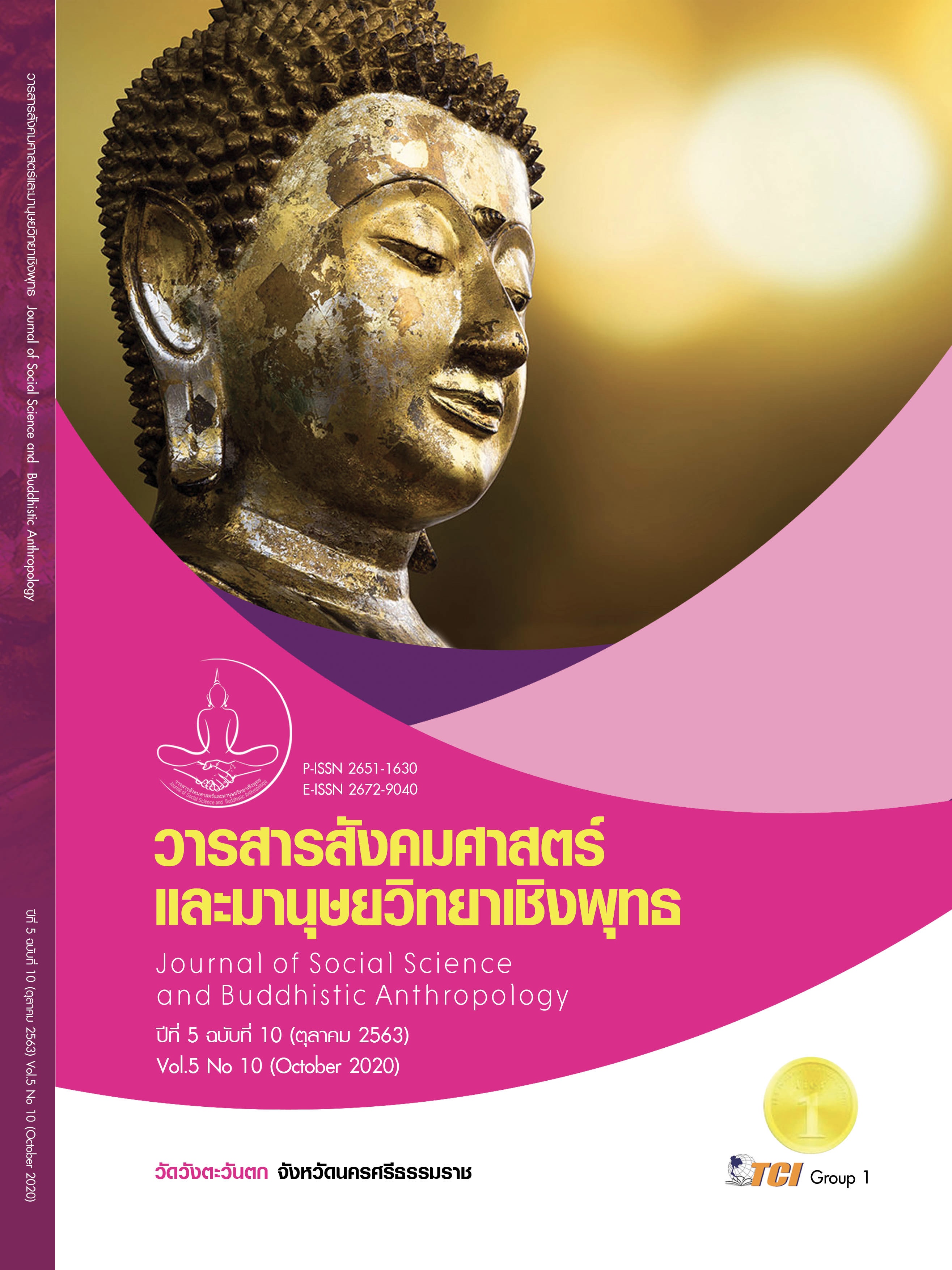THE DEVELOPMENT OF ETHICAL LEADERSHIP INDICATOR OF SMALL PRIMARY SCHOOL DIRECTOR IN THE 21st CENTURY UNDER OFFICE OF BASIC EDUCATION COMMISSION IN THE NORTHEAST REGION
Keywords:
Ethical Leadership, , 21st Century, School Director, Small Elementary SchoolAbstract
The objectives of this article were: 1) To develop the Ethical Leadership Indicator for small elementary school directors. Under the supervision of the Office of the Basic Education Commission in the Northeast and 2) to examine the consistency of the ethical leadership indicator structure model of small primary school administrators. Under the Office of the Basic Education Commission in the Northeast. Developed with empirical data Using quantitative research methods the sample consisted of 800 people in this study. Randomized multistage. The research tool was a questionnaire with a 5 - level estimation scale. The quantitative data were analyzed by a computer program. To find the mean Standard deviation and statistical values to determine the suitability of the data for component analysis. The research results were as follows: 1) the development of the indicator It appears that the ethical leadership indicators of the 21st century small elementary school directors under the Office of the Basic Education Commission in the Northeast have five key components, 15 sub-elements, and 105 indicators which consist of: Trust has three sub -elements. And there are 21 indicators, the responsibility indicator has 3 sub -elements. And there are 21 indicators of moral values with 3 sub - elements and there are 21 indicators, transparency indicators, 3 sub-elements. There are 21 indicators and the respect have 3 sub - elements. There were 21 indicators and 2) the results of the verification of the consistency analysis model of the indicators were found. The developed model is consistent with the empirical data based on the assumptions.
References
กฤษพงษ์ กีรติกร. (2557). การยกระดับคุณภาพครู. ใน การประชุมคณะกรรมการปฏิรูประบบผลิตและพัฒนาครู ครั้งที่ 2/2557. มหาวิทยาลัยธุรกิจบัณฑิตย์.
กล้า ทองขาว. (2562). วิกฤติภาวะผู้นำทางการศึกษาแนวทางการวิจัยและการพัฒนา. กรุงเทพมหานคร: มหาวิทยาลัยธุรกิจบัณฑิต.
ชาญชัย อาจินสมาจาร. (2560). ภาวะผู้นำในองค์การ. กรุงเทพมหานคร: ปัญญาชน.
ทองใบ สุดชารี. (2561). ภาวะผู้นำ: กลไกแห่งการขับเคลื่อนองค์กรสู่การเรียนรู้. อุบลราชธานี: มหาวิทยาลัยราชภัฎอุบลราชธานี.
ประยุทธ ชูสอน. (2559). พฤติกรรมภาวะผู้นำและแนวทางการพัฒนาสู่ความเป็นผู้บริหารมืออาชีพของผู้บริหารโรงเรียนประถมศึกษาในเขตภาคตะวันออกเฉียงเหนือ. ใน ดุษฎีนิพนธ์ศึกษาศาสตรดุษฎีบัณฑิต สาขาวิชาการบริหารการศึกษา. มหาวิทยาลัย ขอนแก่น.
พระราชญาณวิสิฐ. (2558). หลักธรรมาภิบาลและประมุขศิลป์. กรุงเทพมหานคร: ชัยมงคล พริ้นติ้ง.
ภัทราพร เกษสังข์. (2559). การวิจัยเชิงปฏิบัติการ. กรุงเทพมหานคร: จุฬาลงกรณ์มหาวิทยาลัย.
วิเชียร วิทยอุดม. (2560). ภาวะผู้นำ. กรุงเทพมหานคร: ธีระฟิล์ม.
วิโรจน์ สารรัตนะ. (2556). กระบวนทัศน์ใหม่ทางการศึกษา: กรณีทัศนะต่อการศึกษาศตวรรษที่ 21. กรุงเทพมหานคร: ทิพยวิสุทธิ์.
สิวลี ศิริไล. (2560). ความรู้เบื้องต้นเกี่ยวกับความคิดการใช้เหตุผลและจริยธรรม. กรุงเทพมหานคร: มหาวิทยาลัยสวนสุนันทา.
สุดสวาสดิ์ ประไพพฤกษ์. (2561). การพัฒนาตัวบ่งชี้ การบริหารเชิงบูรณาการของผู้บริหารสถานศึกษาขั้นพื้นฐาน สังกัดกระทรวงศึกษาธิการ. ใน ดุษฎีศึกษาศาสตรดุษฎีบัณฑิต สาขาวิชาการบริหารการศึกษา. มหาวิทยาลัยขอนแก่น.
สุเทพ พงศ์ศรีวัฒน์. (2562). ภาวะความเป็นผู้นำ. กรุงเทพมหานคร: เอ็กซ์ปอร์เน็ท.
Cronbach, L. J. (1990). Essentials of psychological testing. New York: Harper Collins Publishers.
Ferrell , O. C. et al. (2018). Business Ethical : Ethical Decision Making and Case (7th ed.). Cincinnati: South- Western College Publishing.
Fullan, M. (2013). The Moral Imperative of School Leadership. Ontario: A Joint Publication.
Glanz, J. (2016). What Every Principal Should Know About Ethical and Spiritual Leadership. Thousand Oaks: Corwin Press.
Grace, B. (2018). Ethical Leadership. Retrieved June 11, 2018, from http://www. ethicalleadership.org/concepts-and-philosophies.html
Hester, J. P. (2013). Ethical Leadership for school administrators and teachers. Tralee: McFarland.
Josephson, M. (2013). Ethical Leadership Outcomes Student Leader Learning Outcomes (SLLO) Project. Retrieved August 10, 2018, from https://sllo.tamu.edu/wp-content/uploads/2018/07/Ethical-Leadership-OUTCOMES-7-28-09.pdf
Klann, G. (2017). Building Character: Strengthening the Heart of Good Leadership. San Francisco: Jossey-Bass Publisher.
Mayer, D. M. et al. (2009). How Low Does Ethical Leadership Flow? Test of a Trickle-down Model. Retrieved April 27, 2018, from http://webuser.bus.umich.edu/dmmayer/Published%20Articles/Mayer,%20Kuenzi,%20Greenbaum,%20Bardes,%20&%20Salvador_OBHDP_2009.pdf
Mendonca, M. (2009). Preparing for Ethical Leadership in Organizations. Canadian Journal of Administrative Sciences / Revue Canadienne des Sciences de l Administration, 18(4), 266 - 276.
Moorhouse, R. J. (2002). Desired Characteristics of Ethical Leaders in Business, Educational, Political and Religious Organizations from East Tennessee: A Delphi Investigation. In Doctor of Education Educational Leadership. East Tennessee State University.
Resick, C. J. et al. (2006). A Cross-Cultural Examination of the Endorsement of Ethical Leadership. Journal of Business Ethics, 63(4), 345 - 359.









